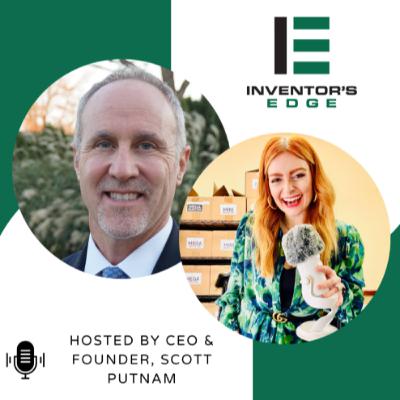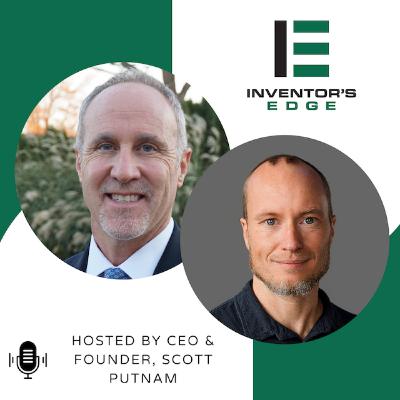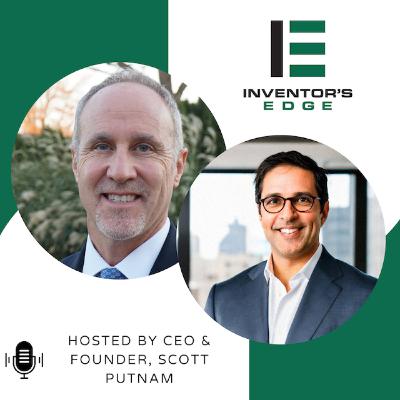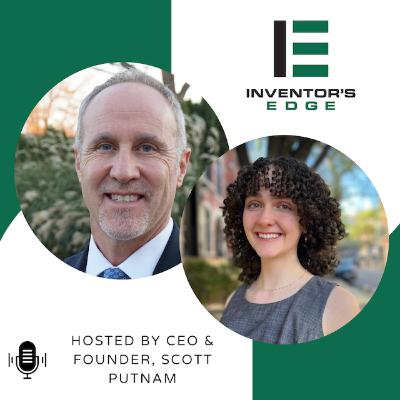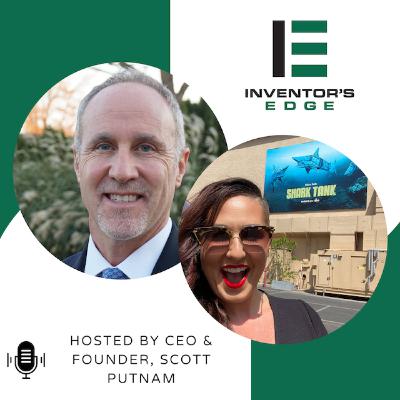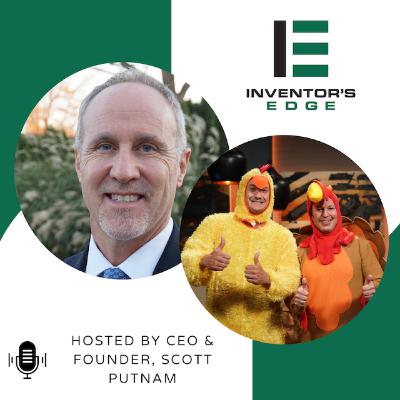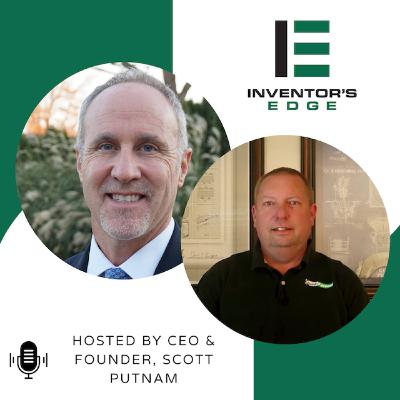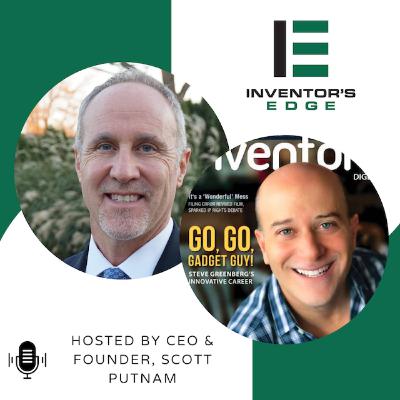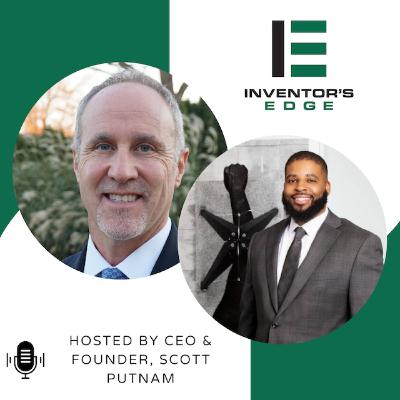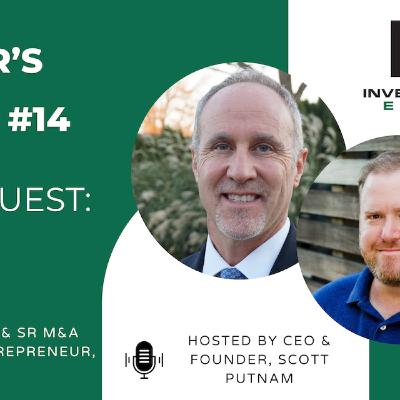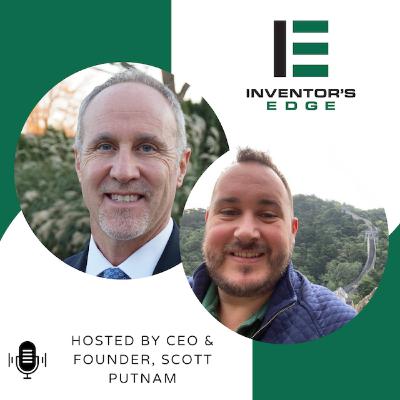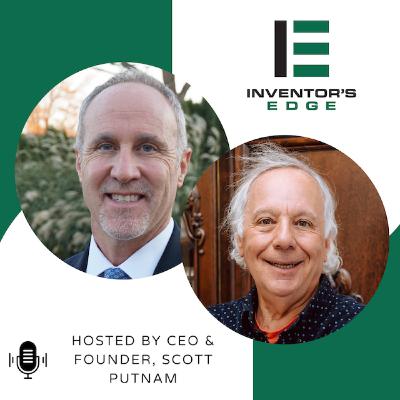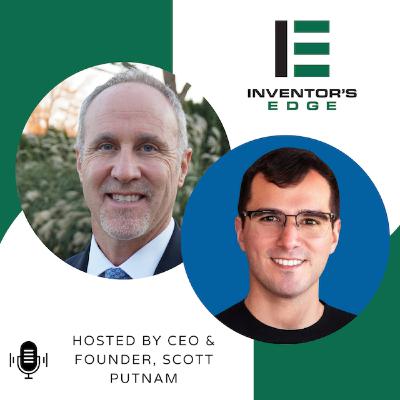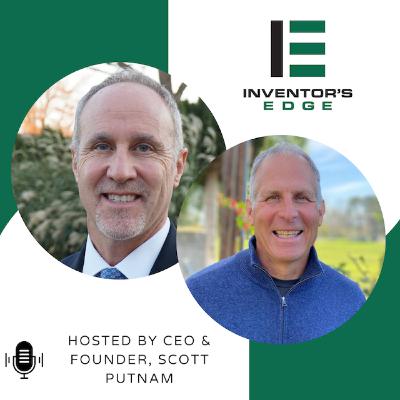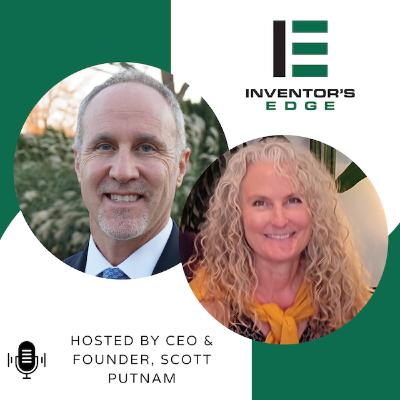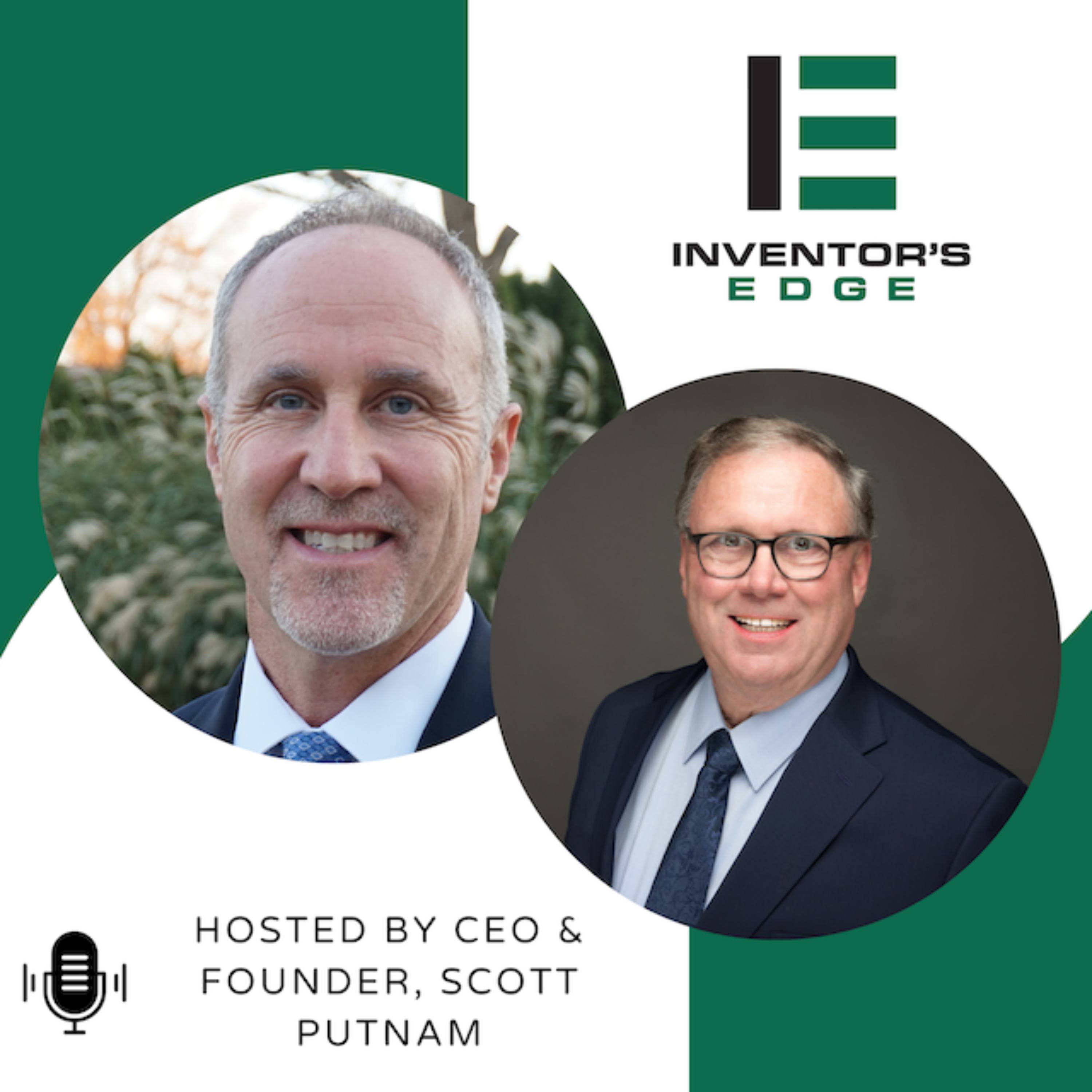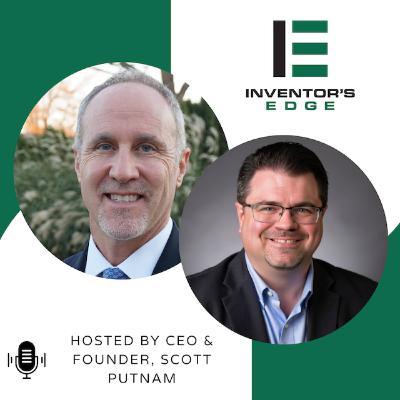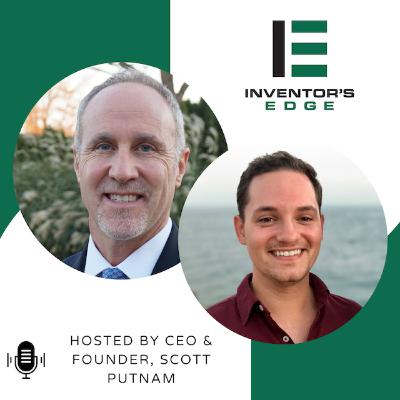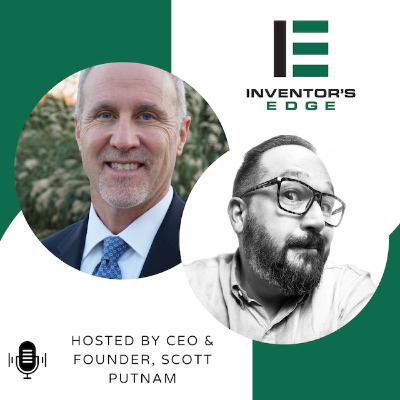Discover Inventor's Edge Podcast
Inventor's Edge Podcast

Inventor's Edge Podcast
Author: Scott Putnam
Subscribed: 3Played: 29Subscribe
Share
© 2025 Inventor's Edge
Description
Whether you’re sketching your first idea or refining a finished product, you’re in the right place! Our mission is to equip you with the tools, expertise, and clarity you need to succeed as an inventor, while helping you conquer fears and limiting beliefs that may be holding you back. Join us as we bring in industry pros, share expert advice, and dive deep into the world of innovation.
23 Episodes
Reverse
Watch the episode on YouTube here.
Summary:
In this episode of the Inventor's Edge show, Liz Garcia shares her journey from corporate life to entrepreneurship, detailing her experiences in founding multiple businesses, including GW Spice Co. and Storage Theory. Liz discusses the personal catalyst that drove her to pursue her passions, the innovative products her company offers, and the strategies she employs to scale her business. She emphasizes the importance of feedback, authenticity, and the need to declutter both physically and mentally to enhance productivity. Liz also offers valuable advice for aspiring entrepreneurs and highlights the significance of coaching and collaboration in business growth.
Key Takeaways:
Liz transitioned from corporate life to entrepreneurship.
Her husband's cancer diagnosis was a catalyst for change.
Starting a business involves trial and error.
Authenticity is key in connecting with customers.
Mistakes should be viewed as learning opportunities.
Focus on your zone of genius to grow your business.
Decluttering can lead to a clearer mind and better focus.
Feedback and testing are crucial for success.
Hiring help can prevent burnout. It's important to chase your dreams and passions.
Learn about our guest, Liz Garcia:
Liz Garcia is Owner of Storage Theory, a 7-figure home organization brand known for its genius home organization/decluttering products sold on Amazon, Walmart.com, and TikTok Shop. She’s also Co-founder of G.W. Spice Co., a fundraising company supporting schools and student-driven organizations with dry salsa mixes, dip mixes, and taco seasoning.
Liz is the host of The Liz Garcia Show, where she inspires busy, purpose-driven go-getters to take bold action towards the things that light them up—sharing real-life stories, business strategies, and fun decluttering tips along the way.
Most recently with her husband, she now coaches product-based business owners and Amazon sellers on how to grow and scale to 6 and 7 figures.
At her core, Liz is a multi-passionate entrepreneur who leads with boldness, authenticity, and a whole lot of heart—and she's on a mission to help others do the same.
Connect with Liz:
LinkedIn
Instagram
Amazon Storefront
Podcast
All Liz’s Links
At Inventor’s Edge, we offer:
Inventor Help
Product Development Courses
1-1 Expert Coaching
Group Coaching Membership
Insightful Blogs
Podcast Featuring Industry Experts
And More!
Click here to learn more about all Inventor’s Edge has to offer.
Connect with Scott on LinkedIn and scroll down to check out his testimonials from past clients here.
Want to connect with like-minded inventors? Join our private Facebook group for inventors here.
👉Get started on your own product ideas today with our free guides:
🚀IE Scorecard: Is Your Idea Ready?
🚀5 Common Mistakes Inventors Make and How to Avoid Them
🚀5 Steps You Can Take Right Now to Help Get Your Product to Market
Watch the episode on YouTube here.
Summary:
In this conversation, Scott Putnam and Jon Corbett discuss Jon's journey into entrepreneurship, particularly focusing on his experiences with Amazon. They explore the importance of making mistakes, learning from failures, and the significance of understanding keywords and product research. Jon shares insights on optimizing listings, the importance of product quality, and the challenges of managing multiple products. The discussion emphasizes the need for resilience, continuous learning, and the value of seeking guidance from knowledgeable individuals in the field.
Key Takeaways:
Making mistakes is a crucial part of learning.
Resilience and determination are key traits for success.
Understanding keywords is essential for product visibility.
Quality products lead to better sales and customer satisfaction.
Optimizing listings can significantly impact sales performance.
Continuous learning is necessary in the ever-evolving Amazon ecosystem.
Having a good support system can ease the entrepreneurial journey.
Diversifying product offerings can enhance business growth.
Effective inventory management is crucial for maintaining sales.
Trusting knowledgeable people can save time and resources.
Learn about our guest, Jon Corbett:
From Freemont, CA, Product developer for 15 years. 7 figure seller on Amazon. Brands: Brosash - Wedding decorations. Secret Stash - Diversion Safes. Experienced Professional with a demonstrated history of working in the Licensing industry. Strong business development expert skilled in Marketing, Entrepreneurship, Public Speaking, Social Media, IP Strategy, and Small Business.
Connect with Jon:
LinkedIn
Website
TikTok
Youtube
Amazon Store Page (Brosash)
Amazon Store Page (Secret Stash)
At Inventor’s Edge, we offer:
Inventor Help
Product Development Courses
1-1 Expert Coaching
Group Coaching Membership
Insightful Blogs
Podcast Featuring Industry Experts
And More!
Click here to learn more about all Inventor’s Edge has to offer.
Connect with Scott on LinkedIn and scroll down to check out his testimonials from past clients here.
Want to connect with like-minded inventors? Join our private Facebook group for inventors here.
👉Get started on your own product ideas today with our free guides:
🚀IE Scorecard: Is Your Idea Ready?
🚀5 Common Mistakes Inventors Make and How to Avoid Them
🚀5 Steps You Can Take Right Now to Help Get Your Product to Market
Watch the episode on YouTube HERE!
Summary:
In this episode of the Inventor's Edge podcast, Scott Putnam interviews Steven Puri, who shares his journey from film to tech and his insights on creativity, focus, and productivity. They discuss the importance of flow states, overcoming distractions, and the value of community in fostering innovation. Steven emphasizes the need for execution over ideas and offers practical tips for managing time and maintaining focus. The conversation highlights the significance of taking the first step towards one's goals and the power of connection in the creative process.
Key Takeaways:
Your idea is worthless; it's execution that matters.
The journey out your front door starts with one step.
We all have something great inside us.
Don't be the grumpy old guy on the sofa.
You have to have skills that apply to get into flow.
You can train your mind to focus better.
Distractions are everywhere; find tools to support you.
Community can enhance creativity and accountability.
Time management is crucial for productivity.
Identify your chronotype to optimize your work schedule.
Learn about our guest, Steve Puri:
Steven is the Founder and CEO of The Sukha Company with the mission to help millions of people find their focus, achieve more and have a healthy work life.
Steven's career started as a newscaster/interviewer for the #1 youth news show in the DC/Baltimore market (on WTTG-TV) and then as a junior software engineer & Thomas J. Watson Scholar at IBM. After attending USC in Los Angeles, he began working in film production and produced computer-generated visual effects for 14 movies including Independence Day which won the Academy Award for Visual Effects.
Steven’s first tech company was Centropolis Effects that produced those CGI effects, and he eventually sold it to the German media conglomerate Das Werk when he was 28. Steven then produced some indie films and eventually went studio-side to develop and produce live-action features as a VP of Development & Production at 20th Century Fox (running the Die Hard and Wolverine franchises) and an EVP at DreamWorks Pictures for Kurtzman-Orci Productions where he worked on Star Trek, Transformers and more.
After Fox, Steven returned to building tech companies and founded The Sukha Company - ‘sukha’ means ‘happiness from self-fulfillment’ in Sanskrit. The Sukha is a focus app that bundles all the tools necessary to have a focused experience and a healthy, productive Workday. Steven lives in Austin, TX now.
Connect with Steve Puri:
Email: Steven@TheSukha.co
LinkedIn
Website
At Inventor’s Edge, we offer:
Inventor Help
Product Development Courses
1-1 Expert Coaching
Group Coaching
Membership
Insightful Blogs
Podcast Featuring Industry Experts
And More!
Click HERE to learn more about all Inventor’s Edge has to offer!
Connect with Scott on LinkedIn and scroll down to check out his testimonials from past clients HERE.
Want to connect with like-minded inventors? Join our private Facebook group for inventors HERE.
👉Get started on your own product ideas today with our free guides:
🚀IE Scorecard: Is Your Idea Ready?
🚀5 Common Mistakes Inventors Make and How to Avoid Them
🚀5 Steps You Can Take Right Now to Help Get Your Product to Market
Watch the episode on YouTube here.
Summary:
In this heartfelt episode, Scott interviews his daughter, Paige Putnam, a third-year business student and young entrepreneur. Paige shares her journey from childhood inventions to founding Paige Putnam Enterprises. The conversation covers her experiences in entrepreneurship, her plant-based cookbook and her role as the Chief Creative Officer at Inventor’s Edge. The episode highlights the importance of family support, perseverance, and the balance between personal and professional life.
Key Takeaways:
Paige’s journey began with a childhood invention, leading to a licensing deal, showcasing the power of creativity and persistence.
The Putnam family emphasizes the importance of supporting each other in their entrepreneurial endeavors, highlighting the value of a strong support network.
Paige manages her studies, business, and family responsibilities and emphasizes the importance of effective time management and prioritization.
Paige stresses the significance of maintaining kindness and positivity, especially when working closely with family.
Paige applies her academic learnings directly to her business, illustrating the practical benefits of education in entrepreneurship.
Learn about our guest, Paige Putnam:
Paige Putnam is a third-year undergraduate business student at DePaul University, majoring in Entrepreneurship with a minor in Theatre Studies, where she is also a student assistant at the Coleman Entrepreneurship Center. In this role, she plans events, coordinates the monthly newsletter, and serves as a connector to student clubs and partner organizations.
Paige is the founder and CEO of Paige Putnam Enterprises, a personal brand focused on teaching people how to live more intentionally and develop better habits to live their most joyful, successful lives. Through her brand, Paige promotes her cookbook Plant-Based Snacks, Apps, & Desserts (published March 2023) as well as online lifestyle and meditation courses.
Paige is also the Chief Creative Officer at Inventor’s Edge, a product development coaching company. In this role, she focuses on web design, online course design, video content creation and editing, podcast creation, social media marketing, email marketing, and more. Additionally, she is part of the marketing team at Swat-N-Scoop, primarily focusing on social media content creation and marketing.
Connect with Paige:
LinkedIn
Website
All Links
Check out Swat-N-Scoop here.
At Inventor’s Edge, we offer:
Product Development Courses
1-1 Expert Coaching
Group Coaching Membership
Insightful Blogs
Podcast Featuring Industry Experts
And More!
Click here to learn more about all Inventor’s Edge has to offer.
Connect with Scott on LinkedIn here and scroll down to check out his testimonials from past clients.
Want to connect with like-minded inventors? Join our private Facebook group for inventors here.
👉Get started on your own product ideas today with our free guides:
🚀IE Scorecard: Is Your Idea Ready?
🚀5 Common Mistakes Inventors Make and How to Avoid Them
🚀5 Steps You Can Take Right Now to Help Get Your Product to Market
Watch the episode on YouTube HERE.
Summary:
In this engaging conversation, Brittany Lammon shares her entrepreneurial journey, detailing the creation of her innovative product, the Chub Rub Patch. From her early experiences as a makeup artist to her transition from a licensing model to manufacturing, Brittany discusses the challenges and triumphs she faced along the way. She emphasizes the importance of consistency, asking questions, and surrounding oneself with supportive individuals. Brittany also highlights the power of social media in promoting her product and offers valuable advice for aspiring entrepreneurs.
Key Takeaways:
Brittany Lammon created the Chub Rub Patch during the pandemic.
Her journey as an inventor began with a need for a practical solution.
She transitioned from a licensing model to manufacturing due to the pandemic.
Social media, especially TikTok, played a crucial role in her product's success.
Brittany emphasizes the importance of not striving for perfection.
Asking questions and seeking mentorship is vital for growth.
Balancing multiple responsibilities requires organization and prioritization.
Overcoming challenges is part of the entrepreneurial journey.
Consistency in efforts is key to success. Surrounding oneself with like-minded individuals fosters support and growth.
Learn about our guest, Brittany Lammon: Inventor, Entrepreneur, and Force of Creative Energy:
Brittany Lammon is the trailblazing inventor behind The Chub Rub Patch, a simple yet game-changing solution to a universally annoying problem: thigh chafing. What began as a personal fix quickly caught fire online, landing her viral fame on TikTok and even a spot on Shark Tank. Her product has empowered people of all body types — women and men — to walk through the world with a little more comfort and confidence.
But Brittany’s story doesn’t stop there. Hailing from Ohio, she’s a licensed cosmetologist and professional makeup artist with a résumé that reads like a creative powerhouse — from working with WWE to being featured on CNN, MSNBC, Golf Magazine, Coors Light ads, indie films, and music videos. She’s taught at elite beauty schools and worked behind the scenes with high-profile clients under high-pressure timelines.
Brittany also holds a U.S. patent for a revolutionary hairstyling tool she developed for fellow professionals, showing her knack for turning everyday problems into innovative products. With fierce passion, real-world hustle, and a deep desire to help others bring their ideas to life, Brittany is redefining what it means to be an inventor — and we’re thrilled to welcome her to the Inventor’s Edge Podcast.
Connect with Brittany:
LinkedIn
Website
The Chub Rub Patch on Amazon
Socials: @thechubrubpatch
At Inventor’s Edge, we offer:
Inventor Help
Product Development Courses
1-1 Expert Coaching
Group Coaching Membership
Insightful Blogs
Podcast Featuring Industry Experts
And More!
Ready to take your idea to the next level and make meaningful connections with other innovators? Click here to learn more about our Group Coaching Membership that meets twice monthly!
Click here to learn more about all Inventor’s Edge has to offer.
Connect with Scott on LinkedIn and scroll down to check out his testimonials from past clients here.
Want to connect with like-minded inventors? Join our private Facebook group for inventors here.
👉Get started on your own product ideas today with our free guides:
🚀IE Scorecard: Is Your Idea Ready?
🚀5 Common Mistakes Inventors Make and How to Avoid Them
🚀5 Steps You Can Take Right Now to Help Get Your Product to Market
Watch the episode on YouTube here.
Summary:
In this conversation, Scott Putnam interviews inventors Brian Halasinski and Kirk Hyust about their journey in creating the Turbo Trusser, a cooking gadget designed to simplify the process of trussing poultry. They discuss the challenges they faced, including their experience on Shark Tank, the importance of retail expansion, and the ongoing battle against counterfeiting. The duo shares valuable insights for aspiring inventors, emphasizing the need for persistence, collaboration, and a strong intellectual property strategy as they look to the future of their brand.
Key Takeaways:
The Turbo Trusser was born out of a need for a simpler way to truss poultry.
Kirk's background as a chef influenced the design of the Turbo Trusser.
The duo faced challenges in licensing their previous inventions due to COVID-19.
Simplicity in product design can lead to easier manufacturing and market entry.
The Shark Tank experience was nerve-wracking but opened many doors for the Turbo Trusser brand.
Retail expansion is crucial for the growth of their product line.
Counterfeiting has been a significant challenge post-Shark Tank, impacting sales.
Building a strong intellectual property portfolio is essential for protecting inventions.
Networking with other inventors and entrepreneurs can provide valuable support and insights.
Persistence and adaptability are key traits for success in the invention space.
Learn about our guests, Kirk & Brian:
Kirk Hyust, from Canton, Ohio, is the co-founder of Turbo Trusser, a stainless steel device that simplifies poultry trussing. An inventive mind with multiple patents, Hyust showcased his culinary innovation on Shark Tank Season 14, securing a $100,000 deal with Kevin O'Leary. Fluent in Portuguese, Hyust is also an avid traveler, passionate chef, and enthusiastic fisherman, bringing creativity and zest to both his professional and personal pursuits.
Brian Halasinski is an experienced product developer, bringing new and innovative products to the consumer retail market through open innovation. He has also been in the medical sales industry for the last 18 years, most recently 7 with Gilead Sciences in the HIV BU. He has worked with a diverse group of customers including Dentists, Pediatricians, Internal Medicine, General Family Practice, OBGYN, Infectious Disease, Pharmacy, and purchasing to name a few. His goals are to be the best sales representative no matter what products he is tasked to sell and to work to help improve patients health. He has a business background as a Kent State University undergraduate and acquired his Masters of Business Administration from Malone University in 2003.
Connect with Kirk & Brian:
Kirk’s LinkedIn
Brian’s LinkedIn
Turbo Trusser Website
At Inventor’s Edge, we offer:
Product Development Courses
1-1 Expert Coaching
Group Coaching Membership
Insightful Blogs
Podcast
And More!
Click here to learn more about all Inventor’s Edge has to offer.
Connect with Scott on LinkedIn and scroll down to check out his testimonials from past clients here.
Want to connect with like-minded inventors? Join our private Facebook group for inventors here.
👉Get started on your own product ideas today with our free guides:
🚀IE Scorecard: Is Your Idea Ready?
🚀5 Common Mistakes Inventors Make and How to Avoid Them
🚀5 Steps You Can Take Right Now to Help Get Your Product to Market
Watch the episode on YouTube here.
Summary:
In this conversation, Kevin Prince, a seasoned patent agent, shares his journey as an inventor and the challenges faced by inventors in the patenting process. He discusses the importance of understanding patent claims, the misconceptions surrounding patents, and the different types of patents available. Kevin emphasizes the significance of strong patents and the role of AI in patent research, while also providing valuable advice for inventors navigating the patent landscape.
Key Takeaways:
Inventors often struggle with getting honest feedback on their ideas.
A patent is primarily a license to stop others from using your invention.
Understanding patent claims is crucial for inventors.
The independent claim is the most critical part of a patent.
Patent pending status does not provide actual protection.
Inventors can launch products and file patents later in the US.
You cannot add new matter to an existing patent application.
AI tools can assist in summarizing patent disclosures.
It's essential to keep ideas secret until patents are filed.
Learn about our guest, Kevin Prince:
Kevin Prince is a Registered Patent Agent and founder of QuickPatents, which helps the independent inventor and small business person protect their inventions. Kevin is an engineer (UC Berkeley, 1988), the author of The Art of the Patent, an inventor, and co-founder of Inventor's Forum in 1990, a non-profit inventors assistance group in Orange County, CA. The holder of three patents himself, Kevin has had multiple successes in business, such as selling his portable computer accessories business to a public company in 2000. He is also the past president of Grid Art, which manufactured a unique line of art supplies sold on QVC, Michael's, and Hobby Lobby. Kevin enlists the help of multiple former patent examiners (both utility and design), draftsmen, engineers, researchers and administrative assistants, as needed, to get your patent application properly drafted, filed, argued and approved.
Connect with Kevin:
LinkedIn
QuickPatents Website
Design Patent Rescue Website
At Inventor’s Edge, we offer:
Product Development Courses
1-1 Expert Coaching
Group Coaching Membership
Insightful Blogs Podcast
And More!
Click here to learn more about all Inventor’s Edge has to offer.
Connect with Scott on LinkedIn and scroll down to check out his testimonials from past clients here.
Want to connect with like-minded inventors? Join our private Facebook group for inventors here.
👉Get started on your own product ideas today with our free guides:
🚀IE Scorecard: Is Your Idea Ready?
🚀5 Common Mistakes Inventors Make and How to Avoid Them
🚀5 Steps You Can Take Right Now to Help Get Your Product to Market
Click here to watch the episode on YouTube.
Summary:
In this engaging conversation, Scott Putnam interviews Steve Greenberg, known as 'The Gadget Guy,' who shares insights from his extensive experience in the gadget and innovation space. They discuss the unpredictable nature of product success, the importance of problem-solving in gadget design, and the common pitfalls inventors face when launching their products. Steve emphasizes the significance of storytelling in product presentation and offers practical advice for creating buzz and credibility. The episode also features a fun segment where they play 'What the Heck is That?' showcasing various innovative products.
Key Takeaways:
A good gadget solves a problem.
The success of a product is unpredictable.
Inventors need to budget for marketing after product development.
Storytelling is crucial in product presentation.
Local media can be a great starting point for exposure.
Engaging demos are essential for TV segments.
Feedback from viewers can improve content.
Networking with other inventors is beneficial.
The importance of a strong elevator pitch cannot be overstated.
Creating buzz requires effort and strategy.
Learn about our guest, Steve Greenberg:
Steve Greenberg is an award-winning author, reporter, TV personality and expert on innovation, new products and technology. Steve Greenberg is the author of “Gadget Nation,” frequent contributor on NBC’s Today Show, and Steve is also the host of YouTube’s Gadget Game Show called “What The Heck Is That?” The game show is sort of “Shark Tank” meets “What’s My Line?”/“I’ve Got A Secret.” During each episode the panelists try to guess the identity of a mystery gadget. Besides YouTube, “What The Heck Is That?” can now also be seen on the streaming platform DBTV. Check out the game show here.
Throughout the year, Steve can be seen demonstrating innovative products in America’s top TV markets including WGN Chicago, NBC Washington DC, FOX Minneapolis, ABC Dallas, NBC Seattle, CBS Houston and about 30 other TV stations. Steve is a judge for innovation competitions around the world including CEATEC in Japan. Steve is a frequent speaker at large events such as FutureVision and IBM’s Innovate Conference.
Steve is a fixture on social media with thousands of followers on X (Twitter), Facebook, IG and LinkedIn. Steve was the host of the Food Network’s "Invention Hunters" and for three years Steve could be seen nationally every weeknight demonstrating innovative products and gadgets on the Discovery Channel’s "Your New House." He also appeared on HGTV’s very popular "Dream Builders" for six years.
Steve was news anchor & reporter for the CBS owned station in Miami. During that time, Steve was honored with 12 Emmy Awards and several national awards including the American Heart Association’s prestigious Blakeslee Award.
Connect with Steve here:
The Gadget Gameshow: What the Heck is That
Website & Blog
LinkedIn
Instagram
Facebook
X (Twitter)
TikTok
At Inventor’s Edge, we offer:
Product Development Courses
1-1 Expert Coaching
Group Coaching
Membership
Insightful Blogs
Podcast
And More!
Click here to learn more about all Inventor’s Edge has to offer.
Connect with Scott on LinkedIn and scroll down to check out his testimonials from past clients here.
Want to connect with like-minded inventors? Join our private Facebook group for inventors here.
👉Get started on your own product ideas today with our free guides:
🚀IE Scorecard: Is Your Idea Ready?
🚀5 Common Mistakes Inventors Make and How to Avoid Them
🚀5 Steps You Can Take Right Now to Help Get Your Product to Market
Watch the episode on YouTube here.
Summary:
In this conversation, David Spears, an IP attorney with a background in mechanical engineering, discusses the importance of intellectual property (IP) for inventors. He explains the different types of IP, including patents, trademarks, copyrights, and trade secrets, and emphasizes the significance of protecting these assets. David shares insights on navigating the patent process, common mistakes inventors make, and the value of design patents. He also highlights current trends in patent law, particularly the impact of AI, and provides resources for inventors looking to protect their ideas. The discussion concludes with David's future endeavors, including a children's book series on IP.
Key Takeaways:
Intellectual property is crucial for monetizing inventions.
Understanding different types of IP is essential for inventors.
Provisional applications must be detailed to be effective.
Trade secrets can provide long-term protection if kept confidential.
Design patents can be a cost-effective way to protect products.
Time constraints are critical in the patent process.
Common mistakes include missing deadlines and not understanding IP types.
AI is influencing current trends in patent law.
Resources like the USPTO can assist small inventors.
Building a relationship with a good attorney can save money and time.
Learn about our guest, David Spears:
David knows that a strong offense is the best defense when it comes to protecting his clients’ valuable intellectual property rights. As an Intellectual Property Attorney with Burris Law, David has built considerable experience across a range of practice areas and industries. He regularly prepares and prosecutes patents for clients internationally and domestically in the robotics, automotive, refrigeration, sports and fitness, and SMART appliance industries, and has a record of providing sound business strategies for clients and colleagues alike. He also has necessary skills to negotiate with the USPTO and advocate for the strongest protections possible for his clients.
David’s background in mechanical engineering is a key strength in his legal practice. While earning his engineering degree from Michigan State, David interned with a Big Three automaker and a major energy supplier. Although the industries were different, he had the same goals for each position: test the equipment, improve efficiency and increase profits for the company. He brings this same mindset to his career in intellectual property law, where he dedicates himself to finding the best, most effective avenues of success for his clients.
While in law school, David interned in the tech transfer department at Michigan State where he performed patentability searches and market analysis on technologies to be protected. As an attorney, David worked with the tech transfer department to patent various technologies giving him a full circle understanding of translating research discoveries and scientific findings into new products, technologies and other services that benefit the public and university.
As an undergraduate, David was a member of the Michigan State football team where he played as a running back for three seasons. Many of the lessons that he learned under Coach Dantonio — such as commitment, team work and a constant drive for improvement — inspired him to bring the same level of focus to his new path in intellectual property law. From his two engineering internships to his time in law school to his clerkship with Harness Dickey, David brings a passion to accomplishing his goals and leading his clients to success.
Connect with David here:
Website
Email
LinkedIn
Instagram
Facebook
YouTube
At Inventor’s Edge, we offer:
Product Development Courses
1-1 Expert Coaching
Group Coaching Membership
Insightful Blogs Podcast
And More!
Click here to learn more about all Inventor’s Edge has to offer.
Connect with Scott on LinkedIn and scroll down to check out his testimonials from past clients here.
Want to connect with like-minded inventors? Join our private Facebook group for inventors here.
👉Get started on your own product ideas today with our free guides:
🚀IE Scorecard: Is Your Idea Ready?
🚀5 Common Mistakes Inventors Make and How to Avoid Them
🚀5 Steps You Can Take Right Now to Help Get Your Product to Market
Watch the episode on YouTube here.
Summary:
In this conversation, Chuck shares his extensive experience in the online business world, detailing his journey from starting his first online business to becoming a broker at Quietlight. He discusses the importance of understanding the entrepreneurial journey, the process of selling a business, and the key factors that influence business valuation. Chuck emphasizes the four pillars of business value: risk, opportunity, transferability, and documentation, and provides actionable steps for entrepreneurs to maximize their business's value before a sale. He also explains the implications of SBA financing and the importance of clean financials in the selling process.
Key Takeaways:
Chuck started his first online business in 1996 and has been an entrepreneur ever since.
Execution of an idea is more important than the idea itself.
Every business has flaws; transparency about them is crucial.
Longevity is key for a business's success and valuation.
The higher the risk, the lower the business value.
Proper documentation is often underestimated by business owners.
Accrual accounting provides a clearer picture of profitability.
Entrepreneurs should prepare their business for sale well in advance.
SBA financing can significantly impact the sale process.
Understanding your numbers is essential for business success.
Learn about our guest, Chuck Mullins:
As a serial entrepreneur and early pioneer of the internet, Chuck built his first profitable website in 1996 at 18 years of age. In college he studied computer software engineering which taught him the skills to analyze search results and implement strategies that take advantage of the observations he makes. Throughout his career of creating, managing, and consulting for dozens of internet-based companies, Chuck has been instrumental in developing strategies that lead to growth and profitability. Among people he works with, Chuck is regarded as “the idea guy.” He is known for his ability to spot opportunities, create a plan, and execute. After seeing an opportunity to leverage his time by acquiring under-performing sites, he has participated in several million dollars worth of acquisitions, which have all shown significant growth and returns.
Connect with Chuck here:
LinkedIn
Website
At Inventor’s Edge, we offer:
Product Development Courses
1-1 Expert Coaching
Group Coaching
Membership
Insightful Blogs
Podcast
And More!
Click here to learn more about all Inventor’s Edge has to offer.
Connect with Scott on LinkedIn and scroll down to check out his testimonials from past clients here.
Want to connect with like-minded inventors? Join our private Facebook group for inventors here!
👉Get started on your own product ideas today with our free guides:
🚀IE Scorecard: Is Your Idea Ready ?
🚀5 Common Mistakes Inventors Make and How to Avoid Them
🚀5 Steps You Can Take Right Now to Help Get Your Product to Market
Watch the episode on YouTube here.
Summary:
In this episode of the Inventor's Edge podcast, host Scott Putnam interviews Carolyn Kean, a seasoned expert in product development and design. They discuss the journey of inventors, the importance of research and prototyping, and the challenges faced in navigating the complex world of patents and intellectual property. Carolyn shares her insights on the value of mentorship, community support, and the necessity of persistence in the face of failure. The conversation emphasizes the need for inventors to conduct thorough research, seek feedback, and understand the business side of their inventions to succeed in the competitive market.
Key Takeaways:
Research your product as if it has already been done.
Prototyping is essential for testing and improving designs.
Feedback from others can help refine your product.
Understanding patents is crucial for protecting your idea.
Mentorship can save you time and money in the invention process.
Failure is a natural part of the innovation journey.
Community support is vital for inventors.
Marketing is just as important as product development.
Don't rush into patenting without thorough research.
Persistence is key to overcoming challenges in invention.
Learn about our guest, Carolyn Keane:
With a diverse career spanning real estate, interior design, product development, and entrepreneurship, Carolyn Keane is a seasoned professional with a passion for innovation and business growth. A graduate of Syracuse University with a B.S. in Interior and Environmental Design, Carolyn has built a reputation as a top producer in B2B sales, construction, and product licensing.
As a real estate broker, she has sold over $60 million in residential properties in South Florida, managed high-performing teams, and worked extensively with relocation companies. Her expertise in staging and property management has helped countless clients maximize their investments.
Beyond real estate, Carolyn has an impressive track record in product development. She designed and manufactured award-winning innovations, secured multiple patents, and successfully licensed a product to a major corporation—earning recognition on QVC and the DIY Network. She has also coached and educated aspiring inventors through InventingDaily.com, helping bring new ideas to market.
A former Vice President of the Inventors Society of South Florida and a motivational speaker for inventor groups, Carolyn brings a wealth of experience and insight to the world of innovation, product development, and business strategy.
Connect with Carolyn on LinkedIn here.
At Inventor’s Edge, we offer:
Product Development Courses
1-1 Expert Coaching
Group Coaching Membership
Insightful Blogs
Podcast
And More!
Click here to learn more about all Inventor’s Edge has to offer.
Connect with Scott on LinkedIn and scroll down to check out his testimonials from past clients here.
Want to connect with like-minded inventors? Join our private Facebook group for inventors here.
👉Get started on your own product ideas today with our free guides:
🚀IE Scorecard: Is Your Idea Ready?
🚀5 Common Mistakes Inventors Make and How to Avoid Them
🚀5 Steps You Can Take Right Now to Help Get Your Product to Market
Watch the episode on YouTube here.
Summary:
In this conversation, Scott Putnam interviews Ben Aldridge, who shares his insights on the challenges faced by inventors and entrepreneurs. Ben discusses the importance of community support, recognizing blind spots, and avoiding common pitfalls when launching a product. He emphasizes the significance of financial management, data-driven decision-making, and the need for a solid intellectual property strategy. Ben also provides practical advice on finding manufacturing partners and streamlining the product development process. In this conversation, Scott Putnam and Ben Aldridge explore the intricacies of manufacturing partnerships, fulfillment strategies, personal productivity, and customer service for entrepreneurs. They discuss the importance of vetting manufacturers, the decision-making process for fulfillment options, maximizing personal productivity through effective time management, and establishing customer service policies that enhance customer retention. The dialogue emphasizes the value of consulting and collaboration in navigating the challenges of bringing products to market.
Key Takeaways:
Don't go it alone; find your tribe.
Be aware of your blind spots and seek help.
Don't try to reinvent the wheel; learn from others.
Keep track of your finances and create budgets.
Make decisions based on data, not emotions.
Create templates for product development processes.
Get a minimal viable product out quickly.
Engage with a good team for IP protection.
Understand your buying power when negotiating.
You only get one chance to make a first impression.
Start conversations with manufacturers to vet them effectively.
Utilize third-party inspectors to ensure quality and compliance.
Consider the value of your time when deciding on fulfillment methods.
3PLs can help manage capacity during peak demand periods.
Know your worth and delegate tasks that don't require your expertise.
Establish customer service policies before launching products.
Store credit can be a cost-effective way to handle returns.
Personal productivity tools can help prioritize tasks effectively.
Consultants can provide valuable insights and avoid common pitfalls.
Building relationships with manufacturers is crucial for long-term success.
Learn about our guest, Ben Aldridge:
Ben Aldridge has spent the past 10+ years working with emerging consumer goods brand founders on all things operations. His specialty is in setting up repeatable, streamlined processes and systems to help small businesses run more efficiently, as well as finding opportunities for cost savings. With Renée Rouleau Skincare, he tripled the warehouse team's pick/pack/ship capacity - without adding headcount. With Dame Products, he saved over 50% on cost of goods - by sourcing and vetting alternate manufacturers in China. Ben is now hanging his shingle as a consultant, working fractionally with founders as they launch their businesses. Sourcing manufacturers and packaging, setting up businesses entities and systems has been a window into the world of entrepreneurship. Ben enjoys working as a #2 to help guide founders on their journey to scaling their business. In his free time, Ben plays saxophone and writes music for the Armadillo Swing Band - he lives in Austin, TX with his partner and their labrador retriever.
Connect with Ben here:
LinkedIn
Website
At Inventor’s Edge, we offer:
Product Development Courses
1-1 Expert Coaching
Group Coaching Membership
Insightful Blogs
Podcast
And More!
Click here to learn more about all Inventor’s Edge has to offer.
Connect with Scott on LinkedIn here and scroll down to check out his testimonials from past clients.
Want to connect with like-minded inventors? Join our private Facebook group for inventors here.
👉Get started on your own product ideas today with our free guides:
🚀IE Scorecard: Is Your Idea Ready?
🚀5 Common Mistakes Inventors Make and How to Avoid Them
🚀5 Steps You Can Take Right Now to Help Get Your Product to Market
Watch the episode on YouTube here.
Summary:
Dr. Dan Formosa, a design and innovation consultant, discusses the relationship between design, behavior, and branding. He emphasizes the importance of understanding user interaction and usability in product design. Dan also highlights the significance of asking questions and the need for companies to stand for something in order to build a strong brand. He explores the impact of design on behavior in various contexts, such as pharmaceuticals and healthcare. Additionally, Dan discusses emerging trends in design and innovation, including the importance of considering gender differences in product design. He also touches on the addictive aspects of social media and the power dynamics involved in remote control design. In this conversation, Dr. Dan Formosa shares insights on the design process and the importance of prototyping and feedback. He discusses the hesitation that comes with putting ideas on paper and the benefits of working with foam and clay in the design process. He also emphasizes the use of blackboards for mind mapping and presenting projects. Dr. Formosa advises inventors to mock up physical prototypes early on and seek honest feedback from a diverse range of people. He cautions against falling in love with the first idea and encourages embracing discomfort for innovation.
Key Takeaways:
Hesitation can arise when putting ideas on paper, leading to a reluctance to commit to a design.
Working with foam and clay allows for more flexibility and organic shape creation in the design process.
Using blackboards for mind mapping and presenting projects provides a dynamic and holistic view of the design process.
Mocking up physical prototypes early on and seeking feedback from a diverse range of people is crucial for product development.
Avoid falling in love with the first idea and be open to change and innovation.
Embrace discomfort as it is often necessary for pushing boundaries and creating innovative solutions.
Learn about our guest, Dan Formosa:
Dan consults with companies and organizations worldwide on design and innovation. An early proponent of “design for all” (a.k.a. Inclusive Design), he also lectures internationally on research and the future of design. He established his company ThinkActHuman with the goal of design for a better world. Dan holds degrees in product design, ergonomics and biomechanics. In addition to ThinkActHuman he co-founded 4B Collective, focused on design and gender, and co-founded the Masters in Branding program at the School of Visual Arts in New York.
He is the recipient of numerous awards, including Smithsonian’s Cooper-Hewitt National Design Award (on behalf of Smart Design). He also received IxDA’s first annual Interaction Design Award, in the “Disruptive” category, for his work with Ford Motor Company. His work is included in the permanent collection of the Museum of Modern Art. He appears in a number of documentary films on design, including the award winning 2020 Life on Wheels.
In other work, he’s the host of the successful YouTube series Well Equipped, produced by Epicurious for Condé Nast, critiquing in a less-than-serious way the usability of various odd kitchen gadgets. He also co-authored and co-illustrated Baseball Field Guide, a bestselling book incorporating the best principles of information design to clearly explain the complex rules of Major League Baseball, now in its fourth edition.
Connect with Dan here:
LinkedIn
Website
Think Act Human
4B Collective
At Inventor’s Edge, we offer:
Product Development Courses
1-1 Expert Coaching
Group Coaching Membership
Insightful Blogs
Podcast
And More!
Click this link to learn more about all Inventor’s Edge has to offer here.
Connect with Scott on LinkedIn here and scroll down to check out his testimonials from past clients.
Want to connect with like-minded inventors? Join our private Facebook group for inventors here.
👉Get started on your own product ideas today with our free guides:
🚀IE Scorecard: Is Your Idea Ready?
🚀5 Common Mistakes Inventors Make and How to Avoid Them
🚀5 Steps You Can Take Right Now to Help Get Your Product to Market
Watch the episode on YouTube here.
Summary:
In this episode of the Inventor's Edge podcast, host Scott Putnam interviews Dan Melnick, CEO and co-founder of Zing. They discuss Dan's entrepreneurial journey, the challenges of engaging audiences in a noisy market, and the importance of clear communication in a culturally diverse team. Dan shares insights on leveraging podcasts for networking and the common fears faced by aspiring entrepreneurs. He emphasizes the need for financial prudence and the importance of persistence in the entrepreneurial journey.
Key Takeaways:
Dan's entrepreneurial journey began with an eBay store at 17.
He pivoted from consulting to full-time entrepreneurship with Zing.
Engaging audiences requires innovative marketing strategies.
Meta platforms like Facebook and Instagram remain effective for marketing.
Cultural differences can create challenges in communication.
Setting clear expectations is crucial for team success.
Documenting processes helps maintain continuity in business.
Podcasts can be a powerful tool for networking and building relationships.
Entrepreneurs often face fears and uncertainties when starting out.
Financial prudence is essential for long-term success in entrepreneurship.
Learn about our guest, Dan Melnick:
CEO & Co-Founder of Zing, Dan Melnick is a dynamic entrepreneur with a passion for software development and direct-to-consumer (D2C) performance marketing. With a strong focus on innovation, Dan has successfully led the creation of the “THINK BIG, with Dan & Qasim” podcast, where he shares insights on entrepreneurship, technology, and business growth. His expertise in building engaging platforms and driving performance marketing strategies has positioned Zing as a leader in the industry. When he’s not busy developing solutions for clients, Dan enjoys connecting with fellow innovators and exploring new trends in the tech space.
Connect with Dan:
LinkedIn
Zing
At Inventor’s Edge, we offer:
Product Development Courses
1-1 Expert Coaching
Group Coaching Membership
Insightful Blogs
Podcast
And More!
Click here to learn more about all Inventor’s Edge has to offer.
Connect with Scott on LinkedIn and scroll down to check out his testimonials from past clients.
Want to connect with like-minded inventors? Join our private Facebook group for inventors here.
👉Get started on your own product ideas today with our free guides:
🚀IE Scorecard: Is Your Idea Ready?
🚀5 Common Mistakes Inventors Make and How to Avoid Them
🚀5 Steps You Can Take Right Now to Help Get Your Product to Market
Watch the episode on YouTube here.
Summary:
In this conversation, Scott interviews Andy Barkin, who shares insights from his diverse background in product design and invention. They discuss the importance of understanding the target audience for inventions, conducting market research, identifying pain points, and generating new ideas. Andy emphasizes the value of incremental improvements in innovation and the necessity of viewing problems through different perspectives to foster creativity. In this conversation, Andy and Scott explore the creative process of invention, emphasizing the importance of embracing ridiculous ideas and innovative juxtapositions. They discuss the role of direct marketing in product design, the significance of understanding the problem-solution dynamic, and the balance between feedback and intuition in the invention process. The dialogue highlights the endless nature of creativity and the necessity of exercising the inventive muscle to generate new ideas.
Key Takeaways:
Andy's diverse background includes television and product design.
Understanding who you are inventing for is crucial.
Market research helps identify the size and needs of your audience.
Pain points are essential for identifying opportunities for invention.
Techniques like bug lists can help generate new ideas.
Incremental improvements can lead to significant innovations.
Trade shows are valuable for networking and market insights.
Google searches and trade publications can provide market data.
Seeing through others' eyes can reveal overlooked problems.
Creativity often requires a numbers game approach to idea generation. Innovative ideas often come from combining disparate elements.
Embrace ridiculous ideas as part of the creative process.
Direct marketing techniques can inform product design.
Understanding the problem-solution dynamic is crucial for inventors.
Listening to feedback is important, but trust your gut.
Creativity is an endless resource; keep exercising it.
Inventions can improve existing products significantly.
Storytelling is a powerful tool in marketing inventions.
Don't be afraid to explore unconventional ideas.
The more ideas you generate, the better your chances of success.
Learn about our guest, Andy Barkin:
Andy Barkin is a storyteller, an inventor, and a long-time business consultant. After working for many years in television and film production, he returned to graduate school for a degree in Product Design Engineering, opened his own design consulting firm and went on to work with many dynamic companies as a consultant. His areas of expertise include invention, innovation, design, manufacturing, and marketing. Andy is the author of the upcoming book, “The Business Case for Empathy.” He lives with his family in Southern California.
Connect with Andy on LinkedIn here.
At Inventor’s Edge, we offer:
Product Development Courses
1-1 Expert Coaching
Group Coaching Membership
Insightful Blogs
Podcast
And More!
Click here to learn more about all Inventor’s Edge has to offer.
Connect with Scott on LinkedIn here and scroll down to check out his testimonials from past clients.
Want to connect with like-minded inventors? Join our private Facebook group for inventors here.
👉Get started on your own product ideas today with our free guides:
🚀IE Scorecard: Is Your Idea Ready?
🚀5 Common Mistakes Inventors Make and How to Avoid Them
🚀5 Steps You Can Take Right Now to Help Get Your Product to Market
Watch the episode on YouTube here.
Summary:
In this conversation, Tara Thelen shares her journey of developing a kitchen product inspired by her experiences living in the Netherlands. She discusses the challenges she faced, including doubts about her ability to market and manufacture the product, and how coaching played a crucial role in her success. Tara emphasizes the importance of relationships in business, the emotional aspects of licensing, and the joy of involving her family in the process. The conversation culminates in the excitement of launching her product and the validation she feels from its reception. In this conversation, Tara Thelen shares her journey as an inventor, emphasizing the importance of maintaining an open mindset when approaching licensing. She discusses the role of coaching in building confidence and navigating the challenges of outreach, while also highlighting the time commitment involved in bringing a product to market. Tara reflects on the human connection fostered through coaching and the empowerment that comes from learning the licensing process. She encourages others to step outside their comfort zones and embrace the journey, acknowledging that while the process may be simple, it is not always easy.
Key Takeaways:
Tara's product was inspired by the necessity of small kitchen spaces.
Overcoming initial doubts was a significant part of her journey.
Coaching provided essential guidance and accountability.
Emotional challenges are a natural part of the licensing process.
Building relationships with companies is crucial for success.
Validation from trade shows boosted her confidence.
Family involvement added a personal touch to the project.
The importance of sustainability in product development was highlighted.
Tara's journey reflects the power of collaboration and support.
Helping others through her product is a key motivation.
An open mindset is crucial for inventors.
Coaching fosters human connection and support.
Everything in the invention process takes time.
Outreach can be daunting but is necessary.
Taking control of your success empowers you.
Learning licensing enables self-sufficiency.
Coaching provides valuable feedback and insights.
Stepping outside your comfort zone leads to growth.
The journey of licensing is simple but not easy.
Persistence and positivity are key in the process.
Learn about our guest, Tara Thelen:
For the past 23 years, Tara Thelen has been working as a professional creative. As a product developer and open-source innovator, she transforms ideas into tangible solutions that not only enhance functionality but also elevate aesthetics. From decorative ideas to practical inventions, her goal is to make life easier and better with her creations. As a translator, editor, and writer, Tara creates with words. Whether she is crafting compelling commercial copy or intricate technical documents, she infuses each piece with depth, resonance, and meticulous research. As an artist, Tara blends traditional and digital mediums to create captivating visuals for book covers, logos, and promotional materials. Her work as a creative is incredibly fulfilling, and she is always eager to explore new avenues of expression across all forms: conceptual, written, audio, and visual.
Connect with Tara:
LinkedIn
EZ Scoop Product
Illumination Graphics
At Inventor’s Edge, we offer:
Product Development Courses
1-1 Expert Coaching
Group Coaching Membership
Insightful Blogs
Podcast
And More!
Click here to learn more about all Inventor’s Edge has to offer.
Connect with Scott on LinkedIn here and scroll down to check out his testimonials from past clients.
Want to connect with like-minded inventors? Join our private Facebook group for inventors here.
👉Get started on your own product ideas today with our free guides:
🚀IE Scorecard: Is Your Idea Ready?
🚀5 Common Mistakes Inventors Make and How to Avoid Them
🚀5 Steps You Can Take Right Now to Help Get Your Product to Market: https://www.inventors-edge.com/pl/2148546978
Watch the episode on YouTube here.
Summary:
In this episode of the Inventor's Edge podcast, Scott Putnam interviews Dr. Dan Brown, a professor at Northwestern University, discussing the essential mindset shifts inventors must make to transition from idea generation to successful product commercialization. They explore the importance of identifying real problems, the significance of differentiation in design, and the critical role of packaging and distribution in bringing products to market. Dr. Brown emphasizes the need for a solid understanding of manufacturing processes and the emotional aspects of design, including the endowment effect that can influence consumer behavior. In this conversation, Scott Putnam and Dan Brown delve into the complexities of innovation, intellectual property, and the challenges faced by small inventors. They discuss the importance of understanding the legal landscape, the impact of competition and knockoffs, and the necessity of building a protective barrier around innovations. The conversation also highlights the significance of community, advocacy, and the need for inventors to be realistic about the risks involved in licensing and product development. Dan shares insights from his experiences, emphasizing the importance of research, competitive advantage, and learning from case studies.
Key Takeaways:
Inventors need to shift their mindset from idea generation to problem-solving.
Identifying a real problem is crucial for market viability.
Differentiation by design can create competitive advantages.
Packaging and distribution are key factors in product success.
Learning about manufacturing processes is essential for inventors.
Empathy in design helps address stakeholder needs.
The endowment effect can hinder product acceptance.
Market research is often overlooked by inventors.
Understanding the supply chain can enhance product design.
Design methodology is as important as scientific methods.
You need to be able to test your innovations.
The intellectual property system is not fair for small inventors.
Successful products attract competition and knockoffs.
Legal battles can be costly and time-consuming.
Small inventors face significant challenges in protecting their rights.
It's crucial to build a protective barrier around your innovations.
Advocacy organizations can help protect inventor rights.
Networking within the inventor community is essential.
Licensing agreements can have hidden pitfalls.
Research and understanding the market are vital for success.
Learn about our guest, Dan Brown:
Dan Brown is an award-winning designer, inventor, entrepreneur, and professor at Northwestern University's Segal Design Institute. A Chicago native, he earned a bachelor's degree in biology from St. Xavier University and later a master's in Product Development from Northwestern. He also holds a PhD in Design from Coventry University. Brown's career spans the chemical and plastics industry, where he applied his science background and leadership skills, and he has developed over 100 patents for innovative products. He founded Consul-Tech Concepts and LoggerHead Tools LLC, creating the acclaimed Bionic Wrench, which has sold nearly 2.5 million units. Brown advocates for design-inspired leadership and ethical sustainability, emphasizing the importance of fair competition and respect for stakeholders' rights in fostering innovation.
Connect with Dan:
LinkedIn
Northwestern University
Teaching Patents and Design Novelty to Engineering Students
At Inventor’s Edge, we offer:
Product Development Courses
1-1 Expert Coaching
Group Coaching Membership
Insightful Blogs Podcast
And More!
Click here to learn more about all Inventor’s Edge has to offer.
Connect with Scott on LinkedIn and scroll down to check out his testimonials from past clients.
Join our private Facebook group for inventors here.
👉Get started on your own product ideas today with our free guides:
🚀5 Common Mistakes Inventors Make and How to Avoid Them
🚀5 Steps You Can Take Right Now to Help Get Your Product to Market
Watch the episode on YouTube here.
Summary:
In this episode of the Inventor's Edge Podcast, Scott Putnam interviews Jake Ward, a registered patent attorney, about the intersection of patent law and artificial intelligence (AI). They discuss how AI is transforming patent searching, the ethical considerations of using AI in legal practice, and the potential future of patent examination with AI tools. Jake emphasizes the importance of human oversight in the patent process and the skills modern attorneys need to adapt to these technological advancements. The conversation highlights the evolving landscape of patent law and the necessity for attorneys to embrace AI as a tool rather than a crutch. In this conversation, Scott Putnam and Jake Ward discuss the current state of AI technology, its implications for patent law, and the evolving role of patent attorneys in guiding inventors through the patent process. They explore the challenges and opportunities presented by AI, the importance of human oversight in legal matters, and the need for regulations to ensure responsible AI usage. The discussion also touches on global perspectives on patent examination and best practices for utilizing AI tools in the patenting process. Ultimately, they emphasize the value of collaboration between inventors and patent attorneys to navigate the complexities of innovation and intellectual property.
Key Takeaways:
Jake Ward has over 20 years of experience as a patent attorney.
AI tools can significantly enhance the efficiency of patent searching.
Ethical considerations are crucial when using AI in legal practice.
Patent attorneys must vouch for every word they write, even if assisted by AI.
AI can help streamline the patent examination process but should not replace human judgment.
The future of patent law will increasingly involve AI technologies.
Attorneys who adapt to using AI will have a competitive advantage.
Inventors should conduct their own patent searches before consulting an attorney.
AI tools are becoming more accessible and affordable for patent searching.
The landscape of patent law is evolving rapidly with technological advancements.
Modern AI technology has plateaued in its advancements.
Patent attorneys play a crucial role in translating technical ideas into legal frameworks.
Collaboration between inventors and attorneys is essential for successful patent applications.
The patent process is complex and requires active involvement from inventors.
Regulations are needed to ensure responsible AI usage in legal contexts.
Human oversight is irreplaceable in the patenting process.
Global patent systems vary in their approach to AI and examination processes.
Best practices for AI tool usage include being cautious about public disclosure.
Inventors should leverage AI as a tool, not a replacement for human expertise.
The future of patents will increasingly involve AI technologies in examination and documentation.
Learn about our guest, Jake Ward:
Jacob “Jake” M. Ward is a registered patent attorney admitted to practice before the United States Patent and Trademark Office, in the State of Michigan, and before the United States District Court of the Eastern District of Michigan. Mr. Ward is also a registered Canadian Patent Agent, non-resident, admitted to practice before the Canadian Intellectual Property Office.
Mr. Ward is the Founding Member with the law firm of Ward Law Office LLC in Tiffin, Ohio. His practice consists of preparation and prosecution of patent applications in various technical arts, including the chemical, mechanical, and electrical arts. Mr. Ward also prepares legal opinions in relation to patentability, infringement, patent validity, and freedom to practice. He further prepares and prosecutes trademark applications, and provides legal opinions on trademark clearance and registration.
He received a Bachelor of Science degree in Biochemistry from the University of Dayton and a Juris Doctor degree, cum laude, from the University of Toledo, College of Law. At the University of Toledo, Mr. Ward was also awarded a certificate of concentration in Intellectual Property Law. Prior to starting his legal practice, Mr. Ward was also a Materials Chemist for many years at the Cooper Tire & Rubber Company in Findlay, Ohio.
Mr. Ward is also the founding author of the legal blog “Anticipate This!” which provides light and humorous commentary on the practice of patent law, trademark law, and science & technology.
Furthermore, Mr. Ward is an adjunct professor at the University of Toledo, College of Law, where he teaches classes on substantive Patent Law and Patent Practice. He has also previously taught classes on Business and Legal Ethics at Tiffin University.
Mr. Ward is a regular speaker on the topic of intellectual property law to inventors clubs, technical organizations, chambers of commerce, business incubators, public libraries, etc. in the United States.
Connect with Jake:
LinkedIn
Website
Free Consultation Call
Contact
Patent and Trademark Law Blog
At Inventor’s Edge, we offer:
Product Development Courses
1-1 Expert Coaching Group Coaching
Membership Insightful
Blogs
Podcast
And More!
Click here to learn more about all Inventor’s Edge has to offer!
Connect with Scott on LinkedIn and scroll down to check out his testimonials from past clients.
Want to connect with like-minded inventors? Join our private Facebook group for inventors here.
👉Get started on your own product ideas today with our free guides:
🚀5 Common Mistakes Inventors Make and How to Avoid Them
🚀5 Steps You Can Take Right Now to Help Get Your Product to Market
Click here if you'd rather watch the episode on YouTube.
Summary:
In this episode of the Inventor's Edge podcast, host Scott Putnam interviews Tom Fekete, a lead industrial designer at Open End Studio. They discuss the intricacies of industrial design, the collaborative process between designers and engineers, and the importance of user-centric design. Tom shares insights into the product development journey, emphasizing the need for research, inspiration, and iterative feedback. He also highlights the challenges of manufacturing and the significance of keeping designs simple yet functional. Tom concludes with a special offer for listeners, inviting them to reach out for a free consultation.
Key Takeaways:
Industrial design combines art, business, and engineering.
The focus of industrial design is on user experience and aesthetics.
Collaboration between designers and engineers is crucial.
Every product requires a unique approach in design.
Research is essential to understand market needs and competitors.
Sketching is a vital part of the idea generation process.
Keeping designs simple can enhance functionality and reduce costs.
User feedback is invaluable in the design process. Understanding manufacturing constraints is key to successful product design.
Experience in the field can help avoid common pitfalls in design.
Learn about our guest, Tom Fekete:
Tamás Fekete is an industrial designer, entrepreneur, and product developer with over a decade of experience. With a background in consumer product design, he has worked across a wide range of product categories, from sports equipment and consumer goods to fabric-based and 3D-printed products.
Specializing in end-to-end product development, Tamás transforms ideas into functional, visually striking products. His expertise spans concept sketching, 3D modeling, photorealistic rendering, and rapid prototyping combined with a wide knowledge of different manufacturing techniques and materials, ensuring the transition from idea to production.
He has designed fabric-based carrying solutions for global brands like Nikon and Logitech and has contributed to multiple patented products, helping inventors refine and bring their concepts to market. As a problem-solver and strategic thinker, Tamás collaborates with inventors, startups, and businesses to optimize usability, elevate design, and develop high-quality, desirable products. Whether working on mass-produced products or bespoke design projects, his approach is always innovation-driven and user-focused.
Connect with Tamás and learn how industrial design principles can take your invention to the next level!
Connect with Tom:
LinkedIn
Website
At Inventor’s Edge, we offer:
Product Development Courses
1-1 Expert Coaching
Group Coaching Membership
Insightful Blogs
Podcast
And More!
Click here to learn more about all Inventor’s Edge has to offer!
Connect with Scott on LinkedIn and scroll down to check out his testimonials from past clients.
Want to connect with like-minded inventors? Join our private Facebook group for inventors here.
👉Get started on your own product ideas today with our free guides:
🚀5 Common Mistakes Inventors Make and How to Avoid Them
🚀5 Steps You Can Take Right Now to Help Get Your Product to Market
Click here to watch the episode on YouTube.
Summary:
In this episode of the Inventor's Edge podcast, host Scott Putnam interviews toy industry expert Matt Nuccio. They discuss the journey of bringing toy ideas to market, the importance of understanding the toy market, and the challenges inventor’s face in product development. Matt shares insights on working with major toy companies, the significance of focusing on primary ideas before extensions, and the evolving landscape of toy design and innovation. In this conversation, Matt shares insights into the toy industry, discussing the excitement of toy awards, the importance of licensing, and the challenges inventors face. He emphasizes the significance of thorough research, understanding market trends, and the role of prototypes in product development. Matt also highlights the value of working with experienced professionals and sales representatives to navigate the complexities of bringing a toy to market. His final advice encourages inventors to stay focused on their creative processes while seeking the right partnerships to succeed.
Link to Cornhole Shootout product mentioned in podcast: https://cornholeshootoutgame.com/
Company that brought this to market along Design Edge: https://abetterdesigncompany.com/
Key Takeaways:
The toy market requires understanding of gameplay and price points.
Successful toy inventors know their market well.
Ideas are just the beginning; execution is key.
Many inventors overcomplicate their products with unnecessary features.
It's crucial to finish the primary product before considering extensions.
Working with experts early can save time and money.
The toy industry has changed, making it easier to enter the market.
Licensing can be a successful avenue for inventors.
Innovation in toys often involves simplifying ideas.
The modern inventor's mindset is shifting towards incorporating technology like AI.
The toy industry has its own set of challenges and rewards.
Licensing is a significant aspect of the toy business.
Inventors often overestimate the potential of their ideas.
Success in toy development is largely a numbers game.
Research is crucial before approaching industry experts.
Understanding market trends can help in timing product launches.
Prototypes are essential for effective presentations to buyers.
Working with experienced agents can streamline the development process.
Sales representatives play a key role in retail success.
Inventors should focus on their strengths and collaborate with others.
Learn about our guest, Matt Nuccio:
Design Edge is a Toy Company for Hire!™ We specialize in transforming your concepts into successful retail products. As your design house, consultant, and manufacturing partner, we handle everything from product and packaging design to engineering and prototyping. We offer insights on retail pricing, marketing strategies, and development plans. Additionally, we manage safety testing, quality control, and shipping logistics, while guiding you through opportunities in licensing, sales, and distribution. Our focus is on delivering quality goods at targeted retail prices and creating a comprehensive launch plan with a clear strategy and timeline. Our ultimate goal is to grow your brand and generate additional revenue streams through effective sales and distribution.
In addition to running Design Edge, I also co-chaired the Toy Association's associate panel, representing designers and inventors in the toy industry. Currently, I serve on several boards, including the United Inventors Association of America (UIA), International Federation of Inventor Associations (IFIA), People of Play (POP), and the education committee of the Toy Association (TA). I contribute a quarterly column to Toy & Family Entertainment magazine and frequently lecture at major events like the New York Toy Fair, ASTRA, POP, USPTO’s Inventor-Con and the Hong Kong Toy Fair, as well as at inventor clubs and private organizations worldwide. Our products have received numerous industry accolades, including nominations and wins for TOTY (Toy of the Year), TAGie (Toy and Game Award), Games 100, Origin, and Family Fun. In 2019, I was honored as an American Innovator by the National Security Agency (NSA), and in 2023, I was recognized by MOJO NATION as one of the 100 Most Influential People in the toy industry for the fifth consecutive year.
Connect with Matt:
LinkedIn
Design Edge Website
At Inventor’s Edge, we offer:
Product Development Courses
1-1 Expert Coaching
Group Coaching Membership
Insightful Blogs
Podcast
And More!
Click here to learn more about all Inventor’s Edge has to offer!
Connect with Scott on LinkedIn and scroll down to check out his testimonials from past clients!
Want to connect with like-minded inventors? Join our private Facebook group for inventors here!
👉Get started on your own product ideas today with our free guides:
🚀5 Common Mistakes Inventors Make and How to Avoid Them
🚀5 Steps You Can Take Right Now to Help Get Your Product to Market


